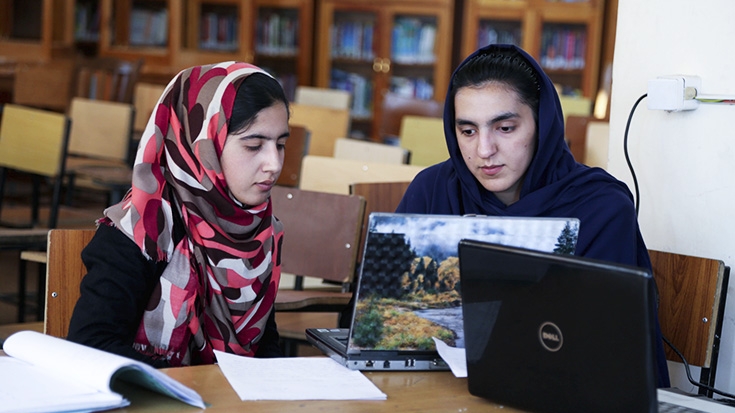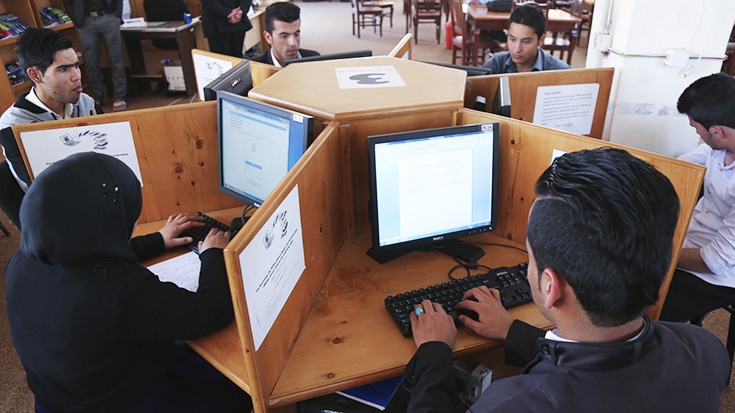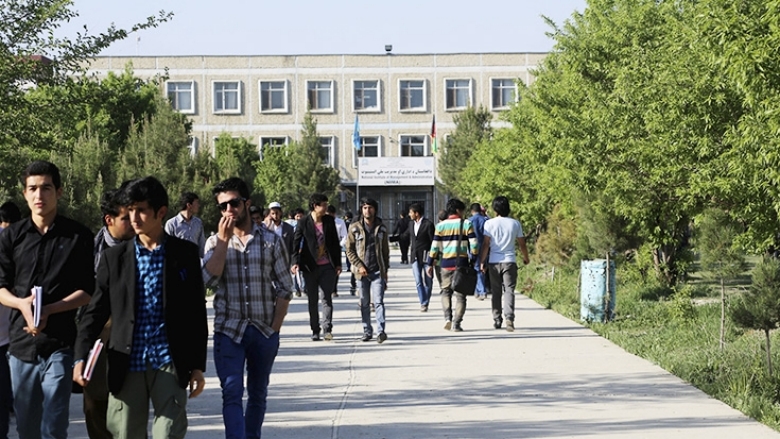One of these modern tools is Fedena, an open source school management software used in more than 40,000 institutions worldwide. Through Fedena, NIMA students can submit their assignments online as well as check their grades, timetable, attendance and other events. “Previously, we would receive our grade reports on paper but now we can check it online anytime,” says Hameed. “This program has also made submitting our assignments online at any time much easier.”
Another unique feature at NIMA is its electronic library, which offers some 12,000 books. The institute’s library itself, used by about 500 students a week, contains 60 computers and 5,000 books on a wide range of topics including management, marketing, commerce, and information technology.
Entry process model of transparency
NIMA has been offering classes in management and administration, accounting, and information and communication technology since its establishment under the Afghanistan Skills Development Program (ASDP), implemented by the Ministry of Education. Classes in hotel management and crisis management will start soon. The World Bank and Afghanistan Reconstruction Trust Fund (ARTF) provided support to NIMA under ASDP, which aimed to build a high quality Technical and Vocational Education and Training (TVET) system.
The World Bank continues to support Afghanistan’s TVET system through a follow-on project, the Afghanistan Second Skills Development Project, with a $55 million grant. NIMA continues to receive support through this follow-on project, which provides incentives to schools and institutes offering formal TVET programs through a challenge fund scheme, while simultaneously strengthening the TVET institutional system as a whole. The institute has received commitments of $2 million in grant support, which will continue until 2018.
Sajedullah Sherzai, NIMA’s dean, is pleased with the presence of such an educational center in Afghanistan: “NIMA is the only fully English medium state-run institute in Afghanistan. The teaching materials used at NIMA are consistent with international standards.” NIMA was an affiliate of the University of Jyväskylä in Finland, and is now affiliated with Ball State University in the United States, which supports NIMA in certification, teaching materials, teacher training, and transparency in entry examinations.
Currently, 1,000 students are studying at NIMA, 20 percent of whom are women. The student body is expected to grow to 1,500 by 2016, representing students from 30 provinces, with almost 40 percent of them being women. The admission exam for NIMA is administered in seven provinces across the country, and the entire process—from registration, test taking, scoring to admissions—has become a model for transparency across the TVET sector.
Abdul Wahab Sahebzada, 20, a management student, is pleased to have been accepted to NIMA: “I came to NIMA when I heard that it is an educational institution of international caliber. I found NIMA to be my dream place and I am chasing my dreams here. I believe NIMA is by far the most well-equipped and uniquely positioned compared to other educational institutions.”
NIMA is on track to being the only Afghan institute to acquire membership of the Accreditation Council for Business Schools and Programs (ACBSP). ACBSP is an international accreditation institution, which accredits educational centers that meet internationally accepted educational standards.
Career fairs enhance employment prospects
So far, 1,542 students have graduated from NIMA in three disciplines, with many graduates certified as meeting international standards. Under an earlier agreement, 1,060 students obtained diplomas from the University of Jyväskylä, and an additional 217 students obtained their diplomas from Ball State University.
To support the future employment of students, a placement cell at NIMA organizes regular career fairs, connecting students with leading private sector companies. A sizable number of graduates have so far been employed by large private sector firms, including Roshan, Etisalat and the Habib Gulzar Company. For students who wish to continue their education to the next level, NIMA is working with local universities such as the Bakhtar Institute of Higher Education to allow students to transfer their credits and obtain a bachelor’s degree.
Mina, 19, a recent graduate, is happy that NIMA has helped her broaden her chances of employment: “Now I can work and have an income,” she says. “Many students in Afghanistan face unemployment upon graduation from higher education institutions, but NIMA has given us a leg up on the job market.”



